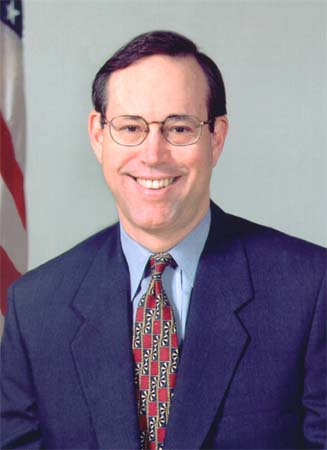
Gov. Taft's plan to overhaul Ohio's tax system fails to resonate with many business execs
Gov. Taft's plan to overhaul Ohio's tax system fails to resonate with many business execs
By Kevin Kemper
Business First of Columbus
Updated: 8:00 p.m. ET April 10, 2005
President Bush and Ohio Gov. Bob Taft, after winning second terms to the highest office in their respective executive branches, each are pushing major policy changes that promise to touch the lives of Ohioans.
Although Bush is seeing national support fade for his effort to restructure Social Security, he is nonetheless getting more support from Central Ohio executives for his reform proposal than Taft is for his endeavor to remake Ohio's tax structure.
Business First's latest quarterly Business Watch survey has found there is generally tepid support from Central Ohio executives for Taft's tax reforms. But business executives are more approving of Bush's plan to allow Americans to keep some of their Social Security payroll taxes and put the money into private accounts.
The divergent views may result from executives' feelings there will be few, if any, ramifications for their daily operations from the president's Social Security reforms, while the governor's plan could change the way many do business.
Still, it appears the more popular plan has the lesser chance of becoming reality.
"I think Taft's tax plan will go forward in some version," said Herb Asher, a political science professor emeritus at Ohio State University who has been following the progress of both proposals. "I think the president's plan is much iffier, because people are realizing that personal accounts could just make (Social Security's) financial situation much worse."
Mixed feelings
Steve Cohen is one of the many area executives who are unsure about the merits of the governor's reform package for Ohio's complex tax system.
Cohen is president of Reynoldsburg-based Screen Machine Industries Inc., which builds equipment that sifts and screens debris, as well as crushes rubble. The machines are used in a variety of industries, including road construction, mining, recycling and composting.
Cohen's company has publicly endorsed the governor's tax plan, but he's conflicted because the company is one of many that have received tax incentives to expand in Ohio.
"Long term, I'm in favor of the plan because we're competing against competitors that don't have a personal property tax in other states," Cohen said, referencing Taft's proposal to eliminate the controversial machinery and equipment tax over two years and the inventory tax over five years. "For the next 10 years, though, I'm opposed to it because we already have a 100 percent abatement."
Screen Machine on Feb. 24 won a 10-year, 100 percent property tax abatement on improvements and new equipment as an incentive to expand and consolidate its two facilities in Etna Township.
As part of the property tax abatement, Cohen committed to hiring 30 additional workers. But Taft has proposed adding new taxes on businesses as part of his reform, which Cohen said would cancel out the benefit of the property tax abatement.
Like Cohen, most executives surveyed in the Business First quarterly poll in mid-March - nearly 68 percent - agreed with Taft's plan to eliminate the personal property tax. Only 14 percent didn't, and almost 19 percent weren't sure about his proposal.
Those same executives were divided, though, on the effect that eliminating the personal property tax would have on their businesses. Nearly 38 percent said it would provide a big incentive to invest in their companies and create jobs, but a little more than 38 percent said it would provide little or no incentive. Two percent said eliminating the tax would be detrimental, and 22 percent said they didn't know.
Big hurdle
The Taft proposal that appears to have the least support is his call for a commercial activity tax, which would replace the corporate franchise tax. Even Taft, in a recent interview with Business First, said he expected that tax would face the most criticism.
Taft called the commercial activity tax a levy on the privilege of doing business in Ohio, and it is based on a company's annual gross receipts in the state, as opposed to the corporate franchise tax which is based on a business' profits.
Taft proposes eliminating the franchise tax for most companies, arguing it's expensive and unproductive. The levy was the 15th highest in 2002 among states with a corporate franchise tax, but ranked 25th for bringing in money. Taft said the poor performance stems from too many loopholes in the tax law.
The commercial activity tax would require companies with sales in Ohio of $1 million or less to pay $100 in taxes. Receipts in excess of $1 million would be taxed at the rate of 0.26 percent. The tax would start July 1, 2006 but wouldn't be fully phased in until 2009.
But just 23 percent of those surveyed said they support the commercial activity tax; 36 percent opposed it but a considerable 42 percent said they don't know what position to take on the proposal.
Columbus-area executives also tend to be unsupportive of various increases in business-related levies Taft has proposed, such as hikes in the kilowatt-hour tax, which affects large consumers of electricity, and the tax on real estate transfers. Almost 47 percent don't support the increased fees, while 28 percent said they do and about 25 percent weren't sure.
Taft told Business First he realizes the reforms won't be a silver bullet that turns around the state's economic fortunes. But he noted Ohio needs help improving its business climate because its economy has lagged nearly every other state since the end of the recession in November 2001.
"We're trying to help small businesses," Taft said, noting that they typically create the most jobs and revenue for the state.
He said he has support for his proposals from the Ohio House and Senate leadership and is sure the reform package will pass in some form.
Social Security view
While there is disagreement on Taft's tax shakeup, most executives surveyed agreed Social Security reform is a pressing issue.
About 18 percent surveyed think Social Security will be bankrupt by 2040, a claim the president has made but which has been disputed over his definition of bankruptcy. Still, 57 percent acknowledged Social Security is facing a fiscal crisis.
A strong majority of those surveyed, nearly 63 percent, supported Bush's proposal to allow wage earners to put part of their Social Security taxes into private accounts in the hopes of getting better investment returns to offset projected reductions in benefit levels. Meanwhile, 26 percent said they don't like that plan and 11 percent said they aren't sure.
Of those surveyed who are 55 or older, nearly 83 percent said personal accounts wouldn't make a difference to them, while 13 percent expect they would be better off.
Survey respondents under age 55 are more fractious on the issue. About 42 percent said personal accounts would improve their situation, while 48 percent said it would make no personal difference. Only 10 percent projected they would be worse off.
Bush has said his reform wouldn't change benefits for Americans 55 and older.
© 2005 Business First of Columbus















